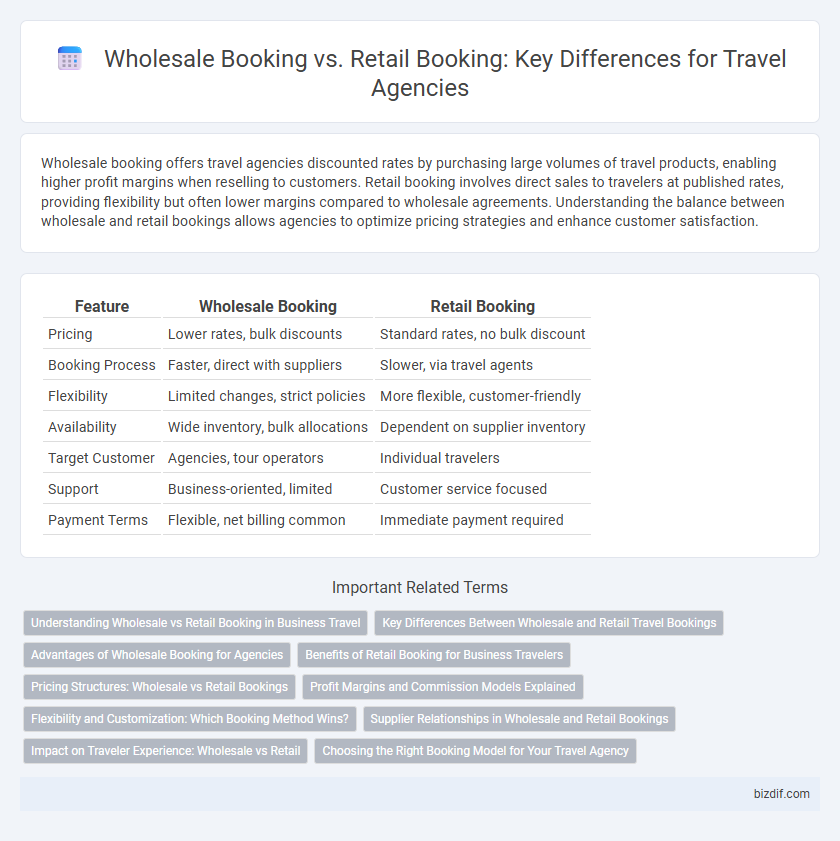Wholesale booking offers travel agencies discounted rates by purchasing large volumes of travel products, enabling higher profit margins when reselling to customers. Retail booking involves direct sales to travelers at published rates, providing flexibility but often lower margins compared to wholesale agreements. Understanding the balance between wholesale and retail bookings allows agencies to optimize pricing strategies and enhance customer satisfaction.
Table of Comparison
| Feature | Wholesale Booking | Retail Booking |
|---|---|---|
| Pricing | Lower rates, bulk discounts | Standard rates, no bulk discount |
| Booking Process | Faster, direct with suppliers | Slower, via travel agents |
| Flexibility | Limited changes, strict policies | More flexible, customer-friendly |
| Availability | Wide inventory, bulk allocations | Dependent on supplier inventory |
| Target Customer | Agencies, tour operators | Individual travelers |
| Support | Business-oriented, limited | Customer service focused |
| Payment Terms | Flexible, net billing common | Immediate payment required |
Understanding Wholesale vs Retail Booking in Business Travel
Wholesale booking in business travel involves purchasing large volumes of travel services at discounted rates from suppliers, enabling agencies to offer competitive pricing to corporate clients. Retail booking caters directly to individual travelers or companies, typically at published rates without bulk discounts, providing flexibility and personalized service. Understanding these differences allows travel agencies to optimize cost-efficiency and service quality for diverse business travel needs.
Key Differences Between Wholesale and Retail Travel Bookings
Wholesale travel bookings involve purchasing large blocks of travel products such as flights, hotels, or tours at discounted rates directly from suppliers, allowing travel agencies to resell them to customers at competitive prices. Retail travel bookings, on the other hand, are transactions where travel agencies or customers book services individually at published prices, often incurring higher costs and less flexibility. Key differences include pricing models, volume discounts, and the level of customization available, with wholesale bookings typically offering greater savings and package options compared to retail bookings.
Advantages of Wholesale Booking for Agencies
Wholesale booking offers travel agencies significant cost savings due to bulk purchasing power, enabling access to discounted rates on flights, hotels, and tours. It enhances inventory control and flexibility, allowing agencies to tailor packages specifically to client preferences while maintaining higher profit margins. This approach also streamlines operations by reducing reliance on third-party vendors, resulting in more competitive pricing and exclusive deals that boost agency credibility.
Benefits of Retail Booking for Business Travelers
Retail booking offers business travelers greater flexibility in itinerary changes, access to personalized customer service, and the ability to select tailored travel options that suit specific professional needs. This approach often includes direct support from travel agents, ensuring smoother handling of last-minute adjustments and special requests. Enhanced transparency in pricing and detailed travel information empowers business travelers to optimize schedules and manage expenses effectively.
Pricing Structures: Wholesale vs Retail Bookings
Wholesale booking pricing structures offer significant discounts by purchasing large volumes of travel services directly from suppliers, allowing travel agencies to access lower rates. Retail booking prices are higher because agents sell individual packages or services to end customers, including a markup to cover operational costs and profits. Understanding the difference between wholesale rates and retail prices helps travel agencies optimize profit margins and offer competitive deals to clients.
Profit Margins and Commission Models Explained
Wholesale booking offers travel agencies higher profit margins by purchasing travel services in bulk at discounted rates, enabling them to resell at competitive prices while retaining a substantial commission. Retail booking involves selling travel products directly to consumers at set prices, often resulting in lower profit margins due to fixed commission rates established by suppliers. Understanding the distinct commission models--wholesale's volume-based discounts versus retail's fixed commissions--is crucial for travel agencies aiming to optimize revenue and profitability.
Flexibility and Customization: Which Booking Method Wins?
Wholesale booking offers greater flexibility and customization by providing access to bulk rates and exclusive package deals, allowing travel agents to tailor trips to unique client preferences with cost savings. Retail booking often involves fixed prices and limited options, but grants immediate bookings and direct service from providers, which may benefit last-minute travelers. For clients prioritizing personalized itineraries and negotiable pricing, wholesale booking typically emerges as the preferred choice.
Supplier Relationships in Wholesale and Retail Bookings
Wholesale booking strengthens supplier relationships by enabling travel agencies to negotiate bulk rates and secure exclusive deals, fostering long-term partnerships with hotels, airlines, and tour operators. Retail booking relies more on standard pricing and immediate availability, often limiting direct interaction and bargaining power with suppliers. Agencies engaged in wholesale booking benefit from enhanced access to inventory and preferential terms, enhancing competitive advantage.
Impact on Traveler Experience: Wholesale vs Retail
Wholesale booking often results in cost savings and bundled services, enhancing affordability but sometimes limiting customization and flexibility for travelers. Retail booking provides more personalized options and direct customer service, improving the overall traveler experience through tailored itineraries and immediate support. Choosing between wholesale and retail impacts factors such as price transparency, itinerary control, and responsiveness to changes during travel.
Choosing the Right Booking Model for Your Travel Agency
Wholesale booking offers travel agencies access to bulk-priced inventory from suppliers, enabling higher profit margins and competitive package customization. Retail booking involves selling directly to consumers, providing more control over pricing and personalized customer service but often with slimmer margins. Selecting the right model depends on your agency's scale, target market, and operational capacity to balance cost efficiency with customer engagement.
Wholesale booking vs Retail booking Infographic

 bizdif.com
bizdif.com